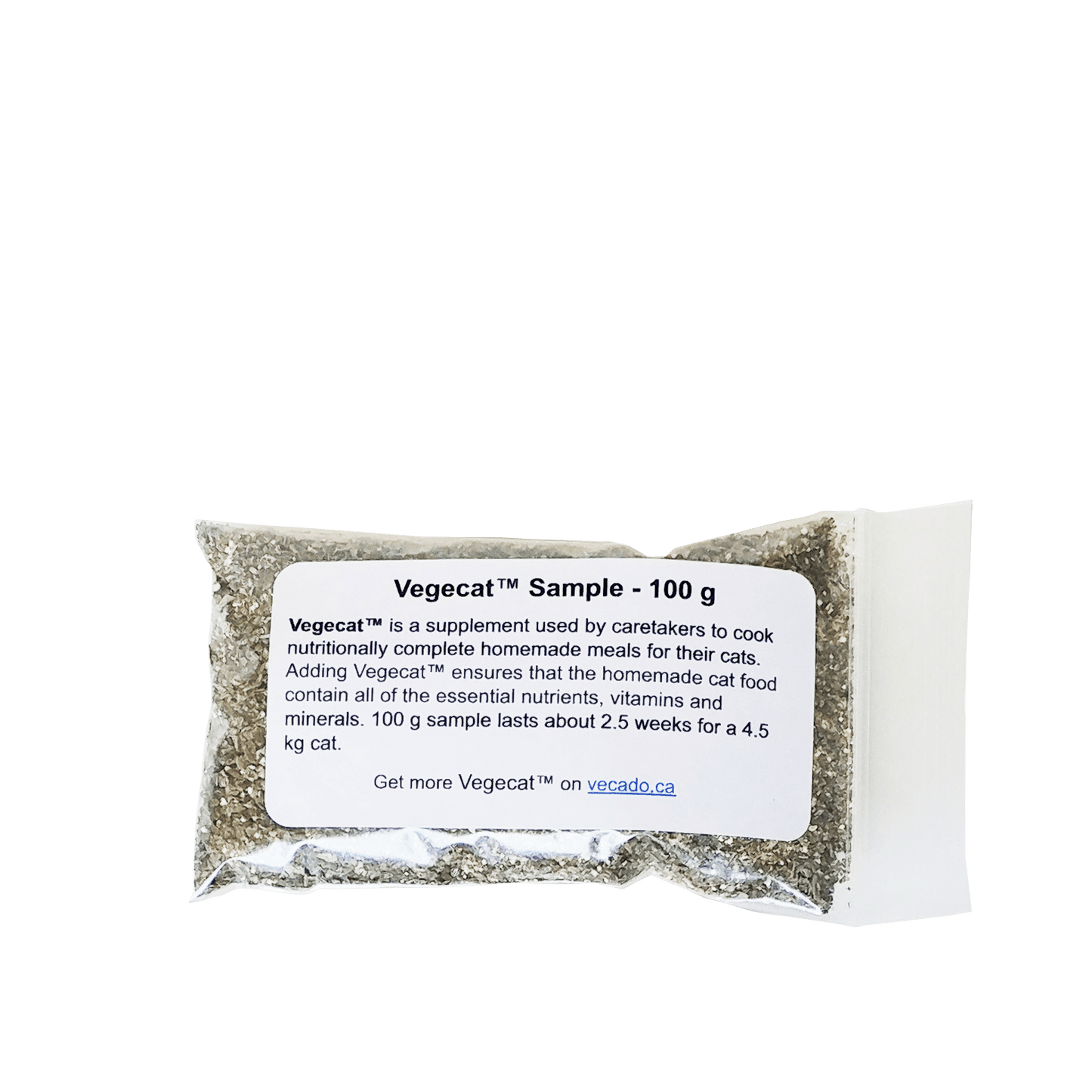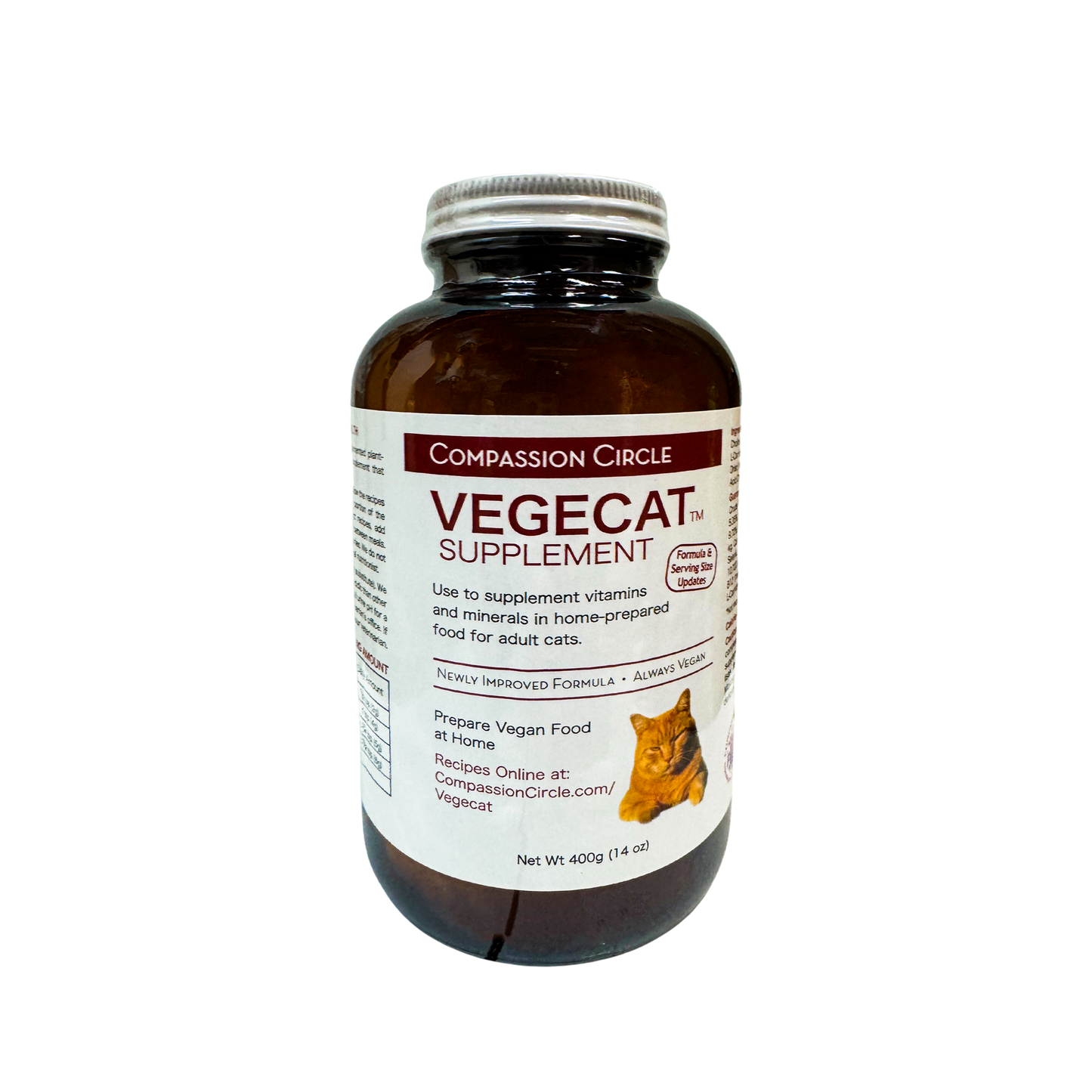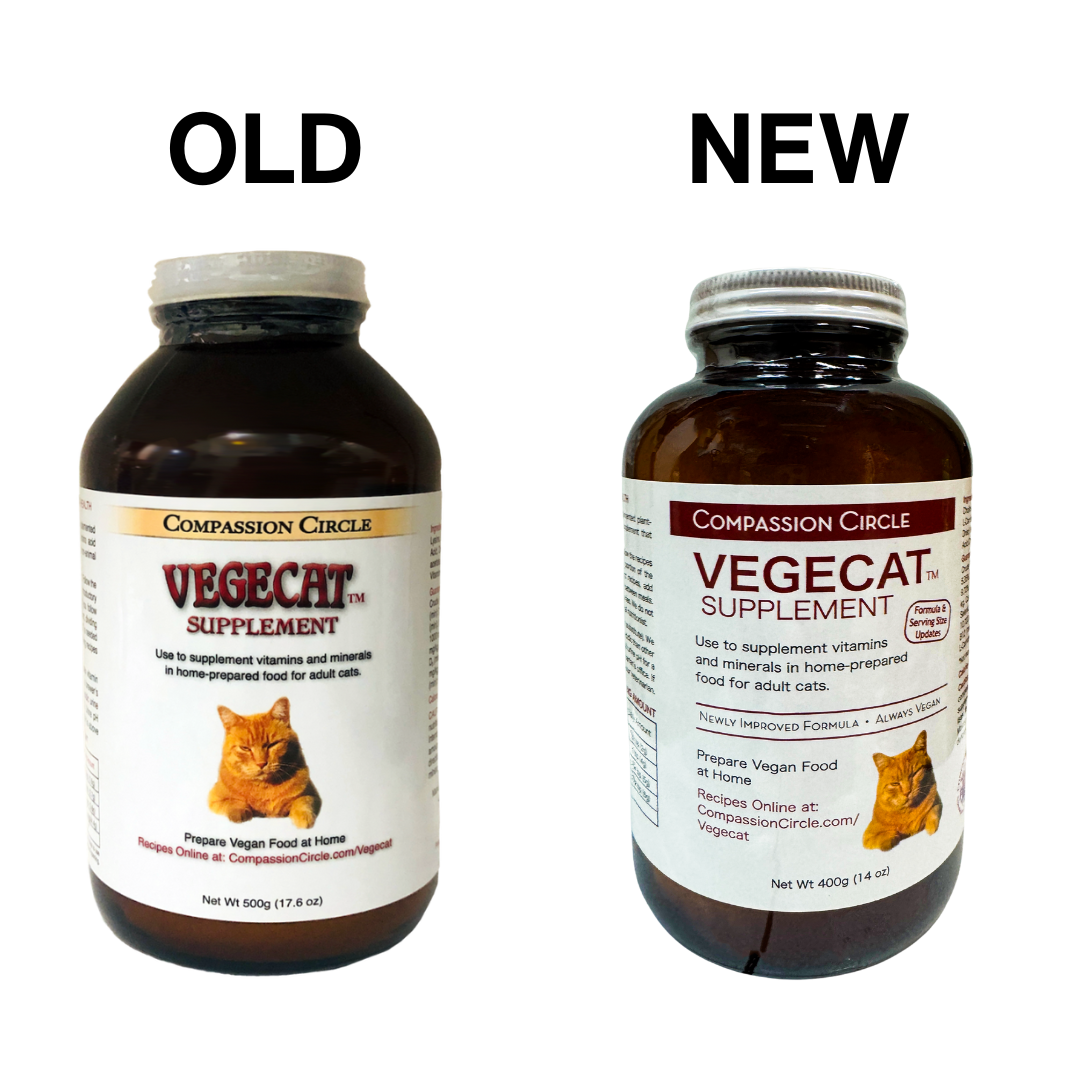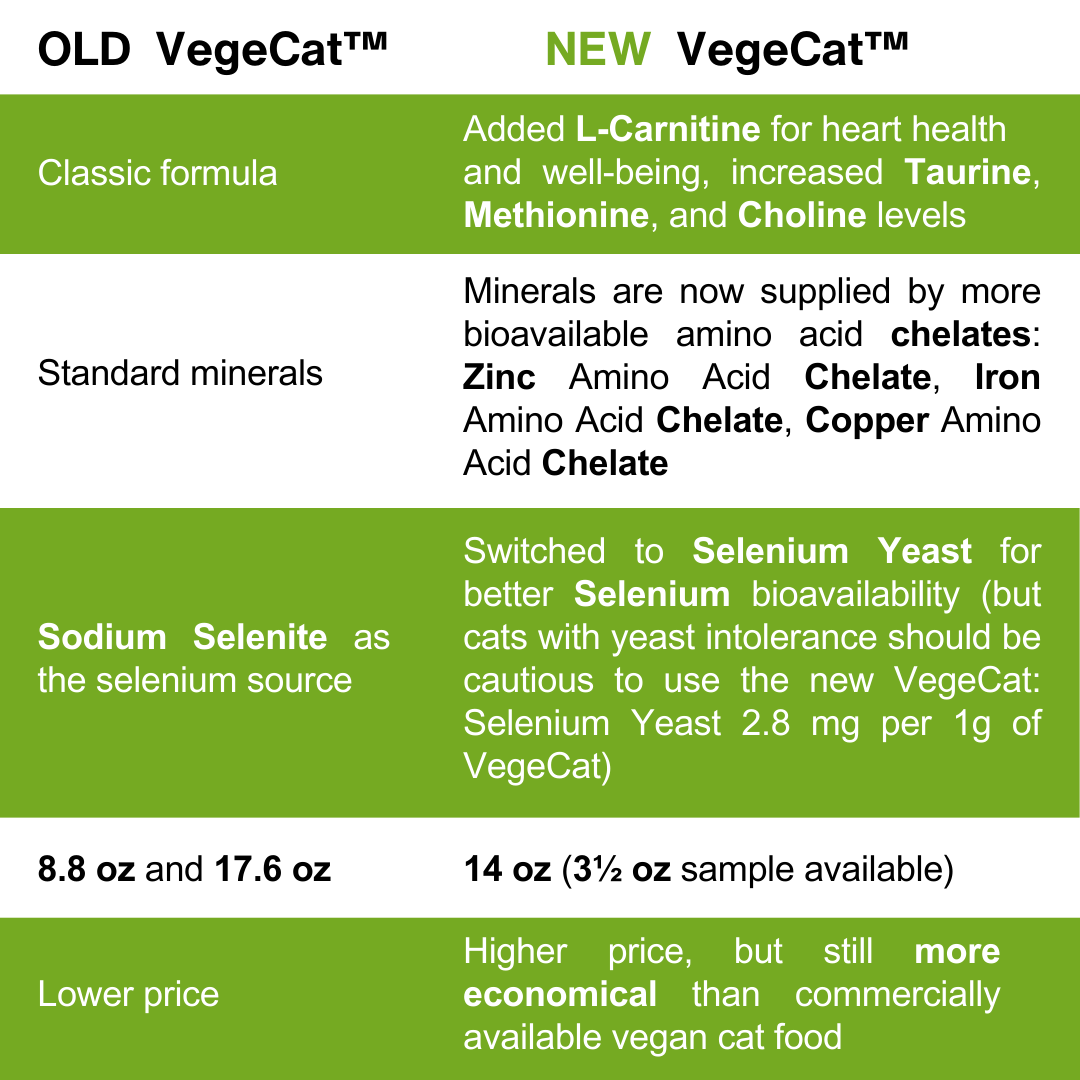VegePet
VegeCat Supplement
VegeCat Supplement
Used for cooking nutritionally complete homemade meals for cats
Couldn't load pickup availability
VegeCat™ is a supplement used by caretakers to cook nutritionally complete homemade meals for their cats. The formula contains all the amino acids, minerals, and vitamins, which, combined with well-balanced VegeCat™ recipes, create 100% complete nutrition. Non-tested on animals, vegan, non-GMO.
VegeCat™ has been used by the compassionate caretakers of numerous cats throughout the world and over many, many years.
IMPORTANT NUTRIENTS
VegeCat™ supplement for cats provides the nutrients cats require from non-animal sources.
- Arachidonic Acid (ARA), is a key nutrient for cats that is required for numerous vital metabolic processes. Derived from the mortierella alpina, then fermented to produce high-quality, vegan ARA.
- Taurine. A shortage of this amino acid causes blindness and heart disease in cats. So it must be supplemented to a vegan diet, and VegeCat™ provides taurine.
- Vitamin A. Through biosynthesis, most mammals make vitamin A from the yellow pigment (carotene) found in vegetables. Cats lack this ability, making a dietary source of this vitamin, found naturally only in animal tissues, essential.
- Vitamin D is another essential vitamin, found naturally mostly in animal tissues as vitamin D3, but is also found in some plant sources. VegeCat™ contains plant-based vitamin D3.
See the full list of ingredients in the Ingredients section below.
RECIPES
Use VegeCat™ Recipe Brochure to cook tasty and healthy food for your cat. The brochure includes recipes for homemade kibble (see pictures) and other delicious and nutritionally complete meals.
BENEFITS
- Nutritionally complete meal. Your cat is getting 100% of nutrients from a home-cooked diet. If you cook cat food at home without any supplements, you must ensure that your cat is getting enough of Taurine, Vitamin D, Vitamin A, and the essential fatty acid - arachidonic acid; these are rare nutrients, which is why supplementing is the best way to provide these nutrients for anyone cooking cat food at home.
- Full control over the ingredients. Cooking cat meals at home gives the ability to select the ingredients you want. You can include the ingredients your cat likes, and exclude those your cat doesn’t like. For example, you can include sweet potato and green peas, and exclude corn and wheat.
- Variety. By cooking cat food at home you have many options when it comes to formulating various flavors, so your cat can always have something different, which adds excitement and energy to your cat.
- Affordable. Cooking cat food at home and supplementing it is the most affordable way to feed your cat; one bag of supplements lasts a long time and is more economical than buying pre-made commercial kibble.
RECOMMENDATIONS
The VegeCat™ supplement is intended for use with VegeDog™ recipes or recipes closely based on ours. Do not add the VegeCat™ supplement to commercial food to avoid over-supplementation. You may feed both commercial and home-prepared food but you should only add the VegeCat™ supplement to the home-prepared portion of the diet, reducing the daily serving size accordingly.
It is best to mix the supplement into prepared warm food, but the supplement can also be added during the cooking process.
We highly recommend using our VegeYeast, a brewer’s yeast modified for acidity. If your cat is allergic to yeast, Vegecat™ is now yeast-free. In place of food yeast in recipes, you may add a 50mg B-complex vitamin twice per week. More tips on Urinary health in cats are on this page.
The ideal urine pH for a cat is 6.0 to 6.5. Urine pH can be tested at home with CheckUp kit for Cats and CheckUp kit for Dogs or at a veterinarian’s office. Wet food is best for the urinary health of cats. If you primarily feed dry kibble, it is best to add moisture to the diet (see the Hydration section below). Pureed vegetables add moisture and additional vitamins and minerals. Veggies should be no more than 10% of the diet to ensure the protein requirement is met. Please see the recipe instructions for more information.
For optimal health, add a lactose-free digestive enzyme product to your cat's diet (see Enzyme Miracle). Also, Green Mush™ — the ultimate superfood for your animal companion — is a wonderful addition to any diet.
DURATION
-
14 oz (400g) bottle:
- 5 lb (2.2 kg) cat – 200 days
- 8 lb (3.6 kg) cat – 130 days
- 10 lb (4.5 kg) cat – 100 days
KITTENS
Kittens (up to 12 months old) should be offered ready-made commercial kibble (such as Evolution Diet, which is suitable for all life stages, including kittens).
Ingredients
Ingredients
Guaranteed Analysis
Guaranteed Analysis
Feeding Amounts
Feeding Amounts
Energy Density
Energy Density
Transition Tips
Transition Tips
Gradual transition is the key to a successful transition.
Start by mixing 1 part of new food and 4 parts of old food.
During the next 2 weeks, gradually increase the amount of new food to 100%.
Older pets and picky eaters may need longer time and extra care to completely switch.
Digestive Enzymes can be used to harden up stool during transition.
Nutritional Yeast has a cheesy flavour, which cats and dogs love.
More transition tips on this page.
Hydration
Hydration
Provide ample water to cats and dogs, and especially male cats due to their urinary anatomy.
Water aids with digestion and helps to avoid urinary issues. Water flushes out pathogens, heavy metals, and harmful drugs.
Soak dry kibble in water to make moist food with 1:1 ratio (1 part kibble to 1 part water), and wait for at least 30 min before serving.
Use distilled water whenever possible.
Incorporate wet canned food for better hydration. Mix wet food with dry kibble to increase moisture level.
Use an electric water fountain to entice pets to drink more water.
Care Instructions
Care Instructions
Store in a dark, cool place, tightly sealed.
For canned food: after opening, remove remaining leftovers and put into an airtight container for up to 3 days, keep it in the fridge. It can also be portioned out and frozen for later use or served as a frosty treat!
Brush your furry friends' teeth regularly.
Offer dental treats after moist food or add several dry kibbles to help scrape off the plague.
Monitor pH of your pet's urine - more info on this page.
Play with your pets daily to keep them active, healthy and happy 🧸
Subscription Info
Subscription Info
Most products on Vecado.com now offer a subscription option!
You can subscribe to receive your products regularly and save 5%
See more details about subscriptions here.
Shipping & Returns
Shipping & Returns
For shipping information, see here








